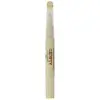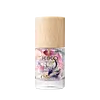What's inside
What's inside
 Key Ingredients
Key Ingredients

 Benefits
Benefits

 Concerns
Concerns

 Ingredients Side-by-side
Ingredients Side-by-side

Prunus Amygdalus Dulcis Oil
Skin ConditioningLanolin
EmollientOlea Europaea Fruit Oil
MaskingGlycine Soja Oil
EmollientTriticum Vulgare Germ Oil
EmollientVitis Vinifera Seed Oil
EmollientC10-30 Cholesterol/Lanosterol Esters
EmulsifyingCera Alba
EmollientSilica Silylate
EmollientCocoyl Hydrolyzed Oat Protein
CleansingTocopherol
AntioxidantParfum
MaskingHydrolyzed Vegetable Protein
Skin ConditioningCarthamus Tinctorius Seed Oil
MaskingWater
Skin ConditioningPanthenol
Skin ConditioningHexyl Cinnamal
PerfumingEquisetum Hyemale Extract
Skin ConditioningRetinyl Palmitate
Skin ConditioningTetrahexyldecyl Ascorbate
Antioxidant3-Hydroxybenzoic Acid
Skin ConditioningLinalool
PerfumingHydroxycitronellal
PerfumingLimonene
PerfumingCoumarin
PerfumingCitric Acid
BufferingPrunus Amygdalus Dulcis Oil, Lanolin, Olea Europaea Fruit Oil, Glycine Soja Oil, Triticum Vulgare Germ Oil, Vitis Vinifera Seed Oil, C10-30 Cholesterol/Lanosterol Esters, Cera Alba, Silica Silylate, Cocoyl Hydrolyzed Oat Protein, Tocopherol, Parfum, Hydrolyzed Vegetable Protein, Carthamus Tinctorius Seed Oil, Water, Panthenol, Hexyl Cinnamal, Equisetum Hyemale Extract, Retinyl Palmitate, Tetrahexyldecyl Ascorbate, 3-Hydroxybenzoic Acid, Linalool, Hydroxycitronellal, Limonene, Coumarin, Citric Acid
Caprylic/Capric Triglyceride
MaskingPrunus Amygdalus Dulcis Oil
Skin ConditioningSilica Dimethyl Silylate
EmollientHelianthus Annuus Seed Oil
EmollientPhenoxyethanol
PreservativeParfum
MaskingTocopheryl Acetate
AntioxidantRosa Canina Fruit Oil
EmollientIsostearyl Isostearate
EmollientCentaurea Cyanus Flower
Skin ConditioningXerochrysum Bracteatum Flower
Skin ConditioningBenzotriazolyl Dodecyl P-Cresol
UV AbsorberPEG-8
HumectantCaprylyl Glycol
EmollientTocopherol
AntioxidantNelumbo Nucifera Flower Extract
Skin ConditioningAscorbyl Palmitate
AntioxidantAscorbic Acid
AntioxidantCitric Acid
BufferingCI 60725
Cosmetic ColorantMek
PerfumingBenzyl Salicylate
PerfumingHexyl Cinnamal
PerfumingGeraniol
PerfumingLinalool
PerfumingCitronellol
PerfumingHydroxycitronellal
PerfumingCaprylic/Capric Triglyceride, Prunus Amygdalus Dulcis Oil, Silica Dimethyl Silylate, Helianthus Annuus Seed Oil, Phenoxyethanol, Parfum, Tocopheryl Acetate, Rosa Canina Fruit Oil, Isostearyl Isostearate, Centaurea Cyanus Flower, Xerochrysum Bracteatum Flower, Benzotriazolyl Dodecyl P-Cresol, PEG-8, Caprylyl Glycol, Tocopherol, Nelumbo Nucifera Flower Extract, Ascorbyl Palmitate, Ascorbic Acid, Citric Acid, CI 60725, Mek, Benzyl Salicylate, Hexyl Cinnamal, Geraniol, Linalool, Citronellol, Hydroxycitronellal
Alternatives
Ingredients Explained
These ingredients are found in both products.
Ingredients higher up in an ingredient list are typically present in a larger amount.
Citric Acid is an alpha hydroxy acid (AHA) naturally found in citrus fruits like oranges, lemons, and limes.
Like other AHAs, citric acid can exfoliate skin by breaking down the bonds that hold dead skin cells together. This helps reveal smoother and brighter skin underneath.
However, this exfoliating effect only happens at high concentrations (20%) which can be hard to find in cosmetic products.
Due to this, citric acid is usually included in small amounts as a pH adjuster. This helps keep products slightly more acidic and compatible with skin's natural pH.
In skincare formulas, citric acid can:
While it can provide some skin benefits, research shows lactic acid and glycolic acid are generally more effective and less irritating exfoliants.
Most citric acid used in skincare today is made by fermenting sugars (usually from molasses). This synthetic version is identical to the natural citrus form but easier to stabilize and use in formulations.
Read more about some other popular AHA's here:
Learn more about Citric AcidHexyl Cinnamal is a fragrance ingredient with a similar scent to jasmine. It can be naturally found in chamomile essential oil.
This ingredient is a known EU allergen and may sensitize the skin. The EU requires this ingredient to be listed separately on an ingredients list.
Hexyl Cinnamal is not water soluble but is soluble in oils.
Learn more about Hexyl CinnamalHydroxycitronellal is a fragrance created from citronellal. The smell of hydroxycitronellal is often described as "citrus-like" or "melon-like".
Hydroxycitronellal is a known EU allergen and may cause irritation when applied to the skin.
Linalool is a fragrance and helps add scent to products. It's derived from common plants such as cinnamon, mint, citrus, and lavender.
Like Limonene, this ingredient oxidizes when exposed to air. Oxidized linalool can cause allergies and skin sensitivity.
This ingredient has a scent that is floral, spicy tropical, and citrus-like.
Learn more about LinaloolParfum is a catch-all term for an ingredient or more that is used to give a scent to products.
Also called "fragrance", this ingredient can be a blend of hundreds of chemicals or plant oils. This means every product with "fragrance" or "parfum" in the ingredients list is a different mixture.
For instance, Habanolide is a proprietary trade name for a specific aroma chemical. When used as a fragrance ingredient in cosmetics, most aroma chemicals fall under the broad labeling category of “FRAGRANCE” or “PARFUM” according to EU and US regulations.
The term 'parfum' or 'fragrance' is not regulated in many countries. In many cases, it is up to the brand to define this term.
For instance, many brands choose to label themselves as "fragrance-free" because they are not using synthetic fragrances. However, their products may still contain ingredients such as essential oils that are considered a fragrance by INCI standards.
One example is Calendula flower extract. Calendula is an essential oil that still imparts a scent or 'fragrance'.
Depending on the blend, the ingredients in the mixture can cause allergies and sensitivities on the skin. Some ingredients that are known EU allergens include linalool and citronellol.
Parfum can also be used to mask or cover an unpleasant scent.
The bottom line is: not all fragrances/parfum/ingredients are created equally. If you are worried about fragrances, we recommend taking a closer look at an ingredient. And of course, we always recommend speaking with a professional.
Learn more about ParfumPrunus Amygdalus Dulcis Oil comes from the sweet almond, a tree native to Iran. This oil has no fragrance and is non-volatile.
Almonds contain healthy fats, vitamins, and minerals. It is a rich source of Vitamin E, a great antioxidant and skin conditioning ingredient. Sweet almond oil contains fatty acids such as linolenic acid and triglycerides.
The content of sweet almond oil makes it a great emollient; it can help soften and hydrate your skin. Emollients create a barrier over your skin to trap moisture in. Sweet almond oil has antioxidant properties.
Those with an almond allergy should be careful of this ingredient and speak with a professional about using it in your skincare.
This ingredient may not be fungal-acne safe.
Learn more about Prunus Amygdalus Dulcis OilTocopherol (also known as Vitamin E) is a common antioxidant used to help protect the skin from free-radicals and strengthen the skin barrier. It's also fat soluble - this means our skin is great at absorbing it.
Vitamin E also helps keep your natural skin lipids healthy. Your lipid skin barrier naturally consists of lipids, ceramides, and fatty acids. Vitamin E offers extra protection for your skin’s lipid barrier, keeping your skin healthy and nourished.
Another benefit is a bit of UV protection. Vitamin E helps reduce the damage caused by UVB rays. (It should not replace your sunscreen). Combining it with Vitamin C can decrease sunburned cells and hyperpigmentation after UV exposure.
You might have noticed Vitamin E + C often paired together. This is because it is great at stabilizing Vitamin C. Using the two together helps increase the effectiveness of both ingredients.
There are often claims that Vitamin E can reduce/prevent scarring, but these claims haven't been confirmed by scientific research.
Learn more about Tocopherol